U13 Beauty课文翻译
北师大版高中英语选修六Unit 18《Beauty》ppt单元小结课件

一、used to 和 would 的用法 ①In 19th-century Europe,women used to wear corsets to achieve a body shape that is no longer considered healthy . ②M en would wear woollen shawls across their shoulders. [自我总结] 1.would 与 used to 都可用来表示 或习惯性的动作,常常可 换用。 2.would 与 used to 都不能用来表示动作发生的具体频度或与 的 重点 一段时间连用。 语法 二、限定词 ①Peterson,the door attendant,found the hat. ②There is some dust on it and several spots. ③How do you know all that information? [自我总结] 3.从上面的句子可以看出限定词是在名词词组中对 中心词起特 指、类指以及表示确定 和非确定数量等限定作用的词类。 4.限定词可分为 位、 位和 位限定词。
2. n. 爱慕,钟爱 3. adj.一致的,始终如一的 4. vt. 伴随,陪同 5. n. (数、量、年龄等的)变化范围 6. n. 良心 7. n. 命令,指挥 8. adj. 容易理解的→ n. 接近;进入;通道,利 用……的权利/机会 9. vt. 递送,传送→ n. 递送 10. n. 尊贵;庄严 11. vt. 消除……的疲劳,使振作精神→ adj. 使人精力充沛的→ adj. 新鲜的,清新的
I (don’t) think... Personally,I’m... That ’s not the point. 功 And to be honest,... So do I. I have to admit.... 能 Wouldn’t you agree...? 重点单词: 1.superior 2.affection 3.consistent 4.accompany 5.range 6.conscience mand 8.accessible;access 9.deliver;delivery 10.dignity 11.refresh;refreshing;fresh 12.tendency;tend 13.vain 14.disturbing;disturb 15.steady 16.freezing;freeze;frozen 17.convey 18.treat;treatment 19.manner 20.strike;striking 21.evident;evidence 22.recommend;recommendation 23.catalogue 重点短语: 答 1.die out 2.to be honest 3.deal with 4.in charge of 5.fall in love with 案 6.be trapped in 7.be tired of 8.be bored to death 9.为……做准备 10. 依靠;依赖 11.热衷于……;非常喜欢…… 12.看不见;忽略 13.一套 14.立刻,马上 15.等一下 16.各种各样的零碎东西 重点句型: 1.It takes 2.what 3.Head bent 4.Down came 5.waiting for 6.must have happened 重点语法: 1.过去经常性 2.具体 3.名词;数量 4.前;中;后
现代大学英语B1U13

What kind of club is that? Why did Jorkens tell story 2?
Text Analysis
Detailed Analysis
Part I: Sentence Paraphrase
Now that a man can carry in a bag a bomb that is more powerful than several battleships, it is hard to find out what any country can do or will do next.” (para. 4 )
W T
B R
Text Analysis
Structure
2 Paras. 5-44 Body: Jorkens told a story about a scientist and the former minister of warfare of a small Caribbean country. 3 Para. 45 Conclusion: The man with a mustache fell silent as if still thinking about what his country almost had achieved.
W T B R
Warming up
Check-on Preview
• Explain the following phrases in your own words . But what if we know how to let loose a plague capable of destroying whole nations? (para. 16) I was on ship in the tropics, and we put into a port. (para. 5) We were so nearly one of the Great Powers but for a fancy that came to his man’s mind. (para. 24)
剑桥三下Unit13Our beautiful environment-课件

只能说:
All the people were able to escape from the fire in time.
• The environment where we stay gives us plants or animals, food and places to live. Where a plant or animal lives is called its habitat. Forest, garden, jungle and desert can make a good habitat.
• need to do sth.
• be + 动词过去分词
and • 比较级
比较级 表示“越来越……,更……”
• worse and worse 越来越差
• (worse – bad, badly比较级)
How many +可数名词复数+其他 How much +可数名词单数+其他
1.How many 3.How much
plants and other animals. • There may be many different kinds of
animals and plants living together in the same habitat. • They all need food for growth.
where引导的定语从句,此句翻译为:我们所待的环境给我们提供了植物、
动物、食物和居住的地方。
• A bird can live in a forest habitat. • A frog can live in a pond habitat. • People can live in the kind of place • where we have enough food, water,
高英7-beauty-译文
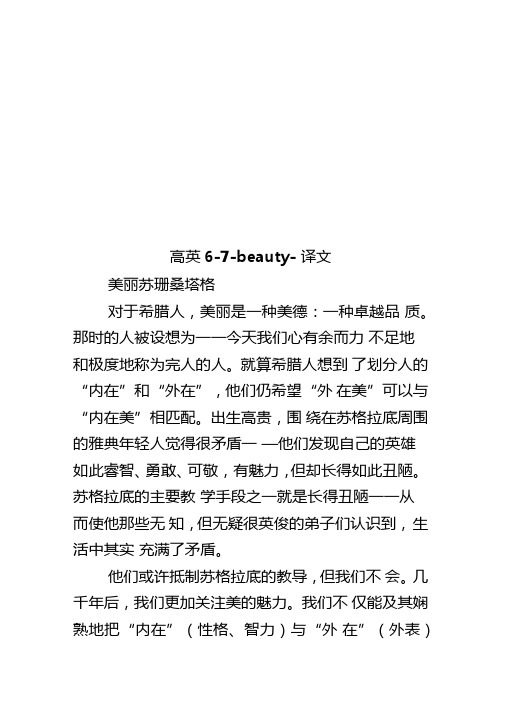
高英6-7-beauty- 译文美丽苏珊桑塔格对于希腊人,美丽是一种美德:一种卓越品质。
那时的人被设想为一一今天我们心有余而力不足地和极度地称为完人的人。
就算希腊人想到了划分人的“内在”和“外在”,他们仍希望“外在美”可以与“内在美”相匹配。
出生高贵,围绕在苏格拉底周围的雅典年轻人觉得很矛盾一—他们发现自己的英雄如此睿智、勇敢、可敬,有魅力,但却长得如此丑陋。
苏格拉底的主要教学手段之一就是长得丑陋一一从而使他那些无知,但无疑很英俊的弟子们认识到,生活中其实充满了矛盾。
他们或许抵制苏格拉底的教导,但我们不会。
几千年后,我们更加关注美的魅力。
我们不仅能及其娴熟地把“内在”(性格、智力)与“外在”(外表)分开,而且实际上,如果什么人很漂亮,同时又睿智、能干而善良,会让我们感到十分惊讶那些。
很大程度上,基督教的影响剥夺了“美丽” 在古希腊罗马人心中关于人类美德理想的中心地位。
基督教把优秀(拉丁文是virtus )仅限制为道的美德,而将美丽看作是一种疏离、随意而肤浅的魅力排除在外。
此外,“美丽”还不断地失去威信。
将近两个世纪以来,把美丽归属于男女两个性别其中之一已经使得美丽在道德上更容易受到攻击。
用英语我们说“美丽的女人”,但却说“英俊的男人”。
“英俊” 一词是“美丽”的阳性同义词也是对"美丽"否定 "美丽"这一恭维因为只用在女人身上而积累了一定的贬损之意。
法语和意大利语可以说男人是“美丽的”,这表明天主教国家(不像那些受基督教新教影响的国家)仍保留着异教徒那种崇拜魅力的遗风。
区别在于(假如区别存在的话)程度不同而已。
在每一个基督化或后基督化的现代国家,女性都是美丽的性别这对于美丽的观念以及女人本身都有损害。
人们认为,称女人美丽是指出了某些东西,它们对于女人的特点和女人关注的事情十分重要。
(相比之下男人一一他们的本质是强壮,或高效、能干。
)并不是挣扎在超前女权主义意识中的人才能觉察到,教导女性去沉溺于美的方式会怂恿自恋,增加依赖和幼稚。
高英unit2beauty翻译

高英unit2beauty翻译高英第二次翻译作业1.One of Socrates' main pedagogical acts was to be ugly and teach those innocent,no doubt splendid-looking disciples7 of his,how full of paradoxes life really was.苏格拉底主要教学方式之一就是不掩饰自身的丑陋,给那些天真无邪,长相好看的门徒们上了生动的一课:生活其实充满矛盾。
2.It was principally the influence of Christianity that deprived beauty of the centralplace it had in classical ideals10 of human excellence.主要受到基督教的影响,美丽这个词从古希腊美德的核心位置中分离出来了3."Handsome" is the masculine equivalent of —and refusal of —a complimentwhich has accumulated certain demeaning overtones16, by being reserved for women only.“英俊”是美丽的阳性对等物。
人们拒绝用美丽去形容男性,因为这个词带有贬低色彩,美丽只用于形容女性。
4.It does not take someone in the throes of advanced feminist awareness toperceive20 that the way women are taught to be involved with beauty encourages narcissism, reinforces dependence and immaturity.不需要具有极端女权主义者的敏锐洞察力,人们也能够察觉到,女性被灌输要注重自身美丽的过程中,滋生了自恋主义,使女性变得更加依赖和不成熟。
Unit 7 Beauty 译文和答案[6页]
![Unit 7 Beauty 译文和答案[6页]](https://img.taocdn.com/s3/m/2a67e7182cc58bd63186bde9.png)
Unit 7 BeautyText A What is True Beauty何谓真美?夏洛特·库钦斯基1 有的数学家认为美的定义就是完美的脸部轮廓。
按照他们的定义,两眼须保持一定距离,鼻子延展适中,颧骨和嘴唇须突出,耳朵须完美的位于头部两侧,头部须位置适中。
同样,身体的其他部位也适用此法则。
躯干须具备一定长度,胳膊与腿须大小适中等等。
2 在我看来,诗人说的对—美在于观看者的眼睛。
我所认为的美很有可能与你所定义的美大相径庭。
美完全取决于我们人类看待彼此的方式。
如果我们只是用眼睛观看,相比用心灵,美更加难以琢磨。
3 随着时间的推移,美的概念发生了很大变化。
曾经有一段时间,女人追求曲线美,而现在苗条成了唯一可以接受的美。
如此极端的观念, 是将美的定义分解成各个身体部位的完美。
其中包括身体的平衡,良好的肤色,年轻,健康以及活力。
不幸的是,美貌并不能保证心灵之美,而心灵之美的缺失能够最终破坏整个美。
4 真正的美应该是外表,心灵,性格,智慧以及心灵的完美组合。
这个定义将极大地拓宽人类对于真正美的观念。
几乎没有人会被认为是普通的,因为世上没有两个一样的人,而且所有人都有自己独一无二之处。
5 不幸的是,男人与女人看待美的角度通常相反。
虽然很多人认为男人比女人批判性更强,然而这话反过来说也对。
女人在分析同龄人时,显得更加苛刻。
6 那么人们为何如此重视外表之美?美貌可以促进学业,职业选择以及生活方式。
貌美的员工可以得到更多的升职与加薪;好看的学生学习更好,因为他们可以掌控教授;漂亮的女人可以引诱男人按照她们的吩咐做事;英俊的男人可以激励女人买单。
以上看似不道德,但是美丽的外表确实在日常生活中扮演重要的角色。
7 美成了一些人的困扰,这些人认为优雅,魅力或者个性,不足以让他们从生活中得到他们想要的。
很多没有完美外表的人诉诸于其他因素来得到别人的帮助;他们用金钱,权力或者性特征作为秘密武器来从别人那里得到自己想要的。
九年级Uni课文翻译

人教版初中英语九年级Unit 3课文翻译Section A 2d何伟:这是欢乐时光公园——我所在城市最大的游乐园!艾丽斯:要尝试一些乘骑项目,我好兴奋呀!何伟:我们应该从哪里开始玩呢?有太空世界、水上世界、动物世界……艾丽斯:哦,你能先告诉我哪儿有洗手间吗?何伟:什么?休息室?你想要休息吗?但是我们还没有开始玩呢!艾丽斯:哦,不是,我的意思不是休息间。
我的意思是……你知道的,卫生间或盥洗室。
何伟:嗯……那么你是指……厕所?艾丽斯:正是!对不起,也许“洗手间”一词在中国不常用。
何伟:对,我们通常说“厕所”或“卫生间”。
就在那边。
艾丽斯:好的,我会很快的!我想知道公园今天何时关门。
何伟:九点三十,你不必着急!Section A 3a欢乐时光公园——永远快乐的时光[艾丽斯和何伟在太空世界。
]艾丽斯:我想知道我们接下来应该去哪里?何伟:那边那个新项目怎么样?艾丽斯:好吧……看起来蛮吓人的。
何伟:快来吧!我保证它将激动人心!如果你害怕,只要大叫或者抓住我的手。
[云霄飞车之后……]艾丽斯:你是对的!太有趣了!起初我好害怕,但大声喊叫还蛮管用的。
何伟:瞧,那玩意并不糟糕,对吧?某些东西你不去尝试,就绝不会知道。
艾丽斯:对,我很高兴我试过了!何伟:你现在想去水上世界么?艾丽斯:好,但我很饿。
你知道我们在哪里能吃到好的快餐?何伟:当然!我建议在水上世界的水城餐馆,那里有美味可口的食物。
艾丽斯:好极了!我们走![在前往水城餐馆途中,艾丽斯和何伟经过鲍勃叔叔餐馆。
]艾丽斯:看!这家餐馆看起来蛮有趣的。
这招牌上说这儿每晚有摇滚乐队演出。
何伟:为什么我们不去餐馆吃晚饭后再来这儿呢?我们问问什么时间乐队开始演出。
[艾丽斯和何伟走向门口的职员。
]何伟:打扰一下,你能告诉我们今晚什么时间乐队开始演出吗?职员:晚上八点,餐馆在此刻总是忙得热火朝天,所以早点来占个位子。
何伟:好的,谢谢你!Section B 2b请问您能……?当你在外国旅游时,知道如何礼貌地寻求帮助很重要。
综合英语教程五beauty英汉翻译

他要教导这些相貌出众却不谙世事的弟子们,生活确
我们则不然。几千年之后,我们更是小
美才被剥夺了它在关于人的优秀品质的古典理想
基督教把优秀的概念限制于道德上的美德,这样便把美束之高阁
人们已经约定俗成把美归之于两性中的一个性别:无论多么美丽,这个
(自恋), reinforces dependence and immaturity. Everybody
and men) knows that. For it is “everybody”, a whole society, that has
being feminine with caring about how one looks. (In contrast to being
我们则不然。几千年之后,我们更是小
only, Christianity set beauty adrift ---- as an alienated, arbitrary, superficial
become a convention to attribute beauty to only one of the two sexes: the sex
the Greeks, beauty was a virtue: a kind of excellence. Persons then were
between a person’s “inside” and “outside”, they still expected that inner
苏格拉底) found it quite paradoxical (自相矛盾的)
把美和妇女相联系,结果使得美在道德上更容易受到批判和攻
九年级U13-U15

4.aim at 瞄准;针对;致力于;旨在
5Байду номын сангаасfor instance 例如;比如 = for example 6.at times 有时;偶尔 = sometimes 7.to start with 首先 8. so that 以便;为了 9. pretend to do ...假装做......
词汇联想
8.appear v.出现;露面 →(反义词)v.消失 disappear→n.消失 disappearance 9.southern adj.南方的 →n.南方 south 10.weigh v.称......;称......重量 →n.重量;体重 weight 11.suit v.适合 n.(一套)衣服 →adj.合适的;适宜的 suitable 12.push v.推→(反义词)v.拉;拖;拔 pull 13.expression n.表达→v.表达 express
人教版新目标
Unit 13 Unit 14 Unit 15
Rainy days make me sad. Have you packed yet? We're trying to save the manatees!
Unit 13 谈论事物对 你的影响 重点词汇: 1.make money 赚钱
词汇、句子梳理
3. I'd rather go to the Lagoon Restaurant because I
like to listen to quiet music while I'm eating. 我 宁愿去蓝色环礁湖餐厅,因为 我喜欢在吃饭 的时候听轻柔的音乐。 4. Loud music makes me tense. 高亢的音乐让我紧 张。 5. I prefer to receive a gift that has some thought
Unit 13 Beauty

Susan Sontag was born in New York, N.Y. Sontag's father, Jack Rosenblatt, had a fur trading business in China - he died of pulmonary (lung) tuberculosis when she was five. Her mother, Mildred, married Capt. Nathan Sontag seven years later. Sontag grew up in Tucson, Arizona, and Los Angeles California, and entered at the age of fifteen (1948) the University of California at Berkeley. After a year she transferred to the University of Chicago, and graduated in 1951. Sontag married in her sophomore year the 28-yearold Philip Rieff, a sociology instructor; they divorced in the late 1950s. Sontag moved with Rieff to Boston and continued her studies at Harvard, where she was a Ph.D. candidate from 1955-1957.
Q3. What are the whole persons? Persons who are perfect in every way, such as in character, in intellect, in looks. Q4. What was the Greeks’ attitude toward the beauty? If the Greeks did know how to distinguish between a person’s “inside” and “outside”, they still expected that inner beauty would be matched by beauty of other kind.
新编英语教程6 U7 beauty中英对照

A beautiful woman, we say in English. But a handsome man. “Handsome” is the masculine equivalent of-and refusal of-a compliment which has accumulate certain demeaning overtones, by being resolved women only. That one can call a man in French and in Italian suggests that catholic countries, unlike those countries shaped by the Protestant version of Christianity, still retain some vestiges of the pagan admiration for beauty. But the differences, if one exists, is of degrees only. In every modern country that is Christian or post-Christian, women are the beautiful sex to the detriment of the notion of beauty as well as of women. To be called beautiful is thought to name something essential to women’s character and concerns. (In contrast to men whose essence is to be strong or competent). It doesn’t take someone in the throes of advanced feminist awareness to perceive that the way women are taught to be involved with beauty encourages narcissism, reinforces dependence and immaturity. Everybody (women and men) knows that. For it is ”every body”, a whole society, that has identified with caring about what one is and does and only secondarily, if at all, about how one looks.) Given these stereotype, it is on wonder that beauty enjoys, at best, a rather mixed reputation.一个美丽的女人,我们在英语中是这么说的。
U13创意阅读2翻译
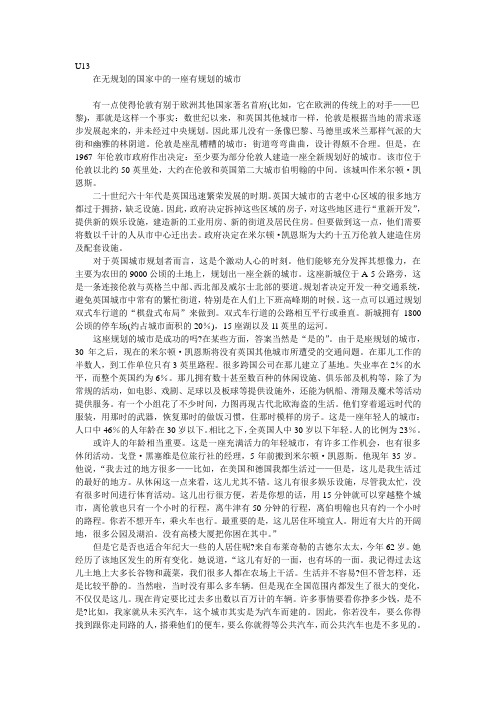
U13在无规划的国家中的一座有规划的城市有一点使得伦敦有别于欧洲其他国家著名首府(比如,它在欧洲的传统上的对手——巴黎),那就是这样一个事实:数世纪以来,和英国其他城市一样,伦敦是根据当地的需求逐步发展起来的,并未经过中央规划。
因此那儿没有一条像巴黎、马德里或米兰那样气派的大街和幽雅的林阴道。
伦敦是座乱糟糟的城市:街道弯弯曲曲,设计得颇不合理。
但是,在1967年伦敦市政府作出决定:至少要为部分伦敦人建造一座全新规划好的城市。
该市位于伦敦以北约50英里处,大约在伦敦和英国第二大城市伯明翰的中间。
该城叫作米尔顿·凯恩斯。
二十世纪六十年代是英国迅速繁荣发展的时期。
英国大城市的古老中心区域的很多地方都过于拥挤,缺乏设施。
因此,政府决定拆掉这些区域的房子,对这些地区进行“重新开发”,提供新的娱乐设施,建造新的工业用房、新的街道及居民住房。
但要做到这一点,他们需要将数以千计的人从市中心迁出去。
政府决定在米尔顿·凯恩斯为大约十五万伦敦人建造住房及配套设施。
对于英国城市规划者而言,这是个激动人心的时刻。
他们能够充分发挥其想像力,在主要为农田的9000公顷的土地上,规划出一座全新的城市。
这座新城位于A-5公路旁,这是一条连接伦敦与英格兰中部、西北部及威尔士北部的要道。
规划者决定开发一种交通系统,避免英国城市中常有的繁忙街道,特别是在人们上下班高峰期的时候。
这一点可以通过规划双式车行道的“棋盘式布局”来做到。
双式车行道的公路相互平行或垂直。
新城拥有1800公顷的停车场(约占城市面积的20%),15座湖以及1l英里的运河。
这座规划的城市是成功的吗?在某些方面,答案当然是“是的”。
由于是座规划的城市,30年之后,现在的米尔顿·凯恩斯将没有英国其他城市所遭受的交通问题。
在那儿工作的半数人,到工作单位只有3英里路程。
很多跨国公司在那儿建立了基地。
失业率在2%的水平,而整个英国约为6%。
那儿拥有数十甚至数百种的休闲设施、俱乐部及机构等,除了为常规的活动,如电影、戏剧、足球以及板球等提供设施外,还能为帆船、滑翔及魔术等活动提供服务。
九年级英语名师面对面u13作文
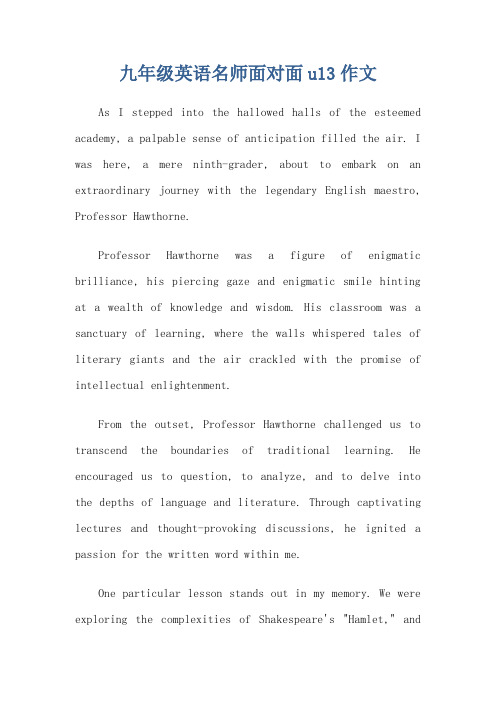
九年级英语名师面对面u13作文As I stepped into the hallowed halls of the esteemed academy, a palpable sense of anticipation filled the air. I was here, a mere ninth-grader, about to embark on an extraordinary journey with the legendary English maestro, Professor Hawthorne.Professor Hawthorne was a figure of enigmatic brilliance, his piercing gaze and enigmatic smile hinting at a wealth of knowledge and wisdom. His classroom was a sanctuary of learning, where the walls whispered tales of literary giants and the air crackled with the promise of intellectual enlightenment.From the outset, Professor Hawthorne challenged us to transcend the boundaries of traditional learning. He encouraged us to question, to analyze, and to delve into the depths of language and literature. Through captivating lectures and thought-provoking discussions, he ignited a passion for the written word within me.One particular lesson stands out in my memory. We were exploring the complexities of Shakespeare's "Hamlet," andProfessor Hawthorne's insights were nothing short of revelatory. He dissected the play's themes of madness, betrayal, and revenge with such clarity and eloquence that I felt as if I were witnessing the unfolding of a grand masterpiece.Beyond the classroom, Professor Hawthorne was an unwavering mentor. He dedicated countless hours to nurturing our literary aspirations, offering guidance on our essays and encouraging us to pursue our creative endeavors. His belief in our potential was a constant source of inspiration, driving us to strive for excellence. As the year drew to a close, I realized that my encounter with Professor Hawthorne had been transformative. He had not only imparted an unparalleled knowledge of English literature but had also instilled in me a profound love for the art of language.In the tapestry of my educational journey, Professor Hawthorne's influence will forever be etched in vibrant hues. He was more than a teacher; he was a catalyst who ignited my passion for learning and set me on a path of literary discovery.As I bid farewell to my extraordinary mentor, I carried with me not only a wealth of knowledge but also a profound sense of gratitude. Professor Hawthorne had not merely taught me about English literature; he had taught me about the power of words, the beauty of expression, and the transformative nature of human connection.And so, I left the hallowed halls of the academy, my heart filled with a newfound appreciation for the written word and an unyielding determination to pursue my literary dreams. The legacy of Professor Hawthorne would forever guide me, inspiring me to embrace the challenges of language and to strive for excellence in all my endeavors.。
beauty译文之欧阳理创编
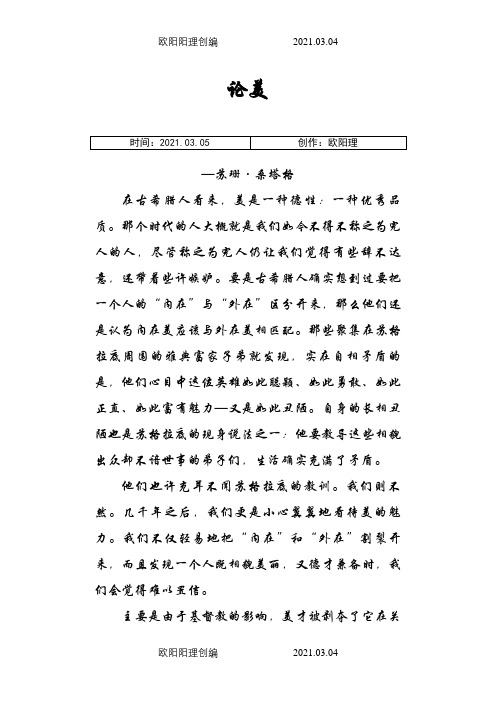
论美—苏珊·桑塔格在古希腊人看来,美是一种德性:一种优秀品质。
那个时代的人大概就是我们如今不得不称之为完人的人,尽管称之为完人仍让我们觉得有些辞不达意,还带着些许嫉妒。
要是古希腊人确实想到过要把一个人的“内在”与“外在”区分开来,那么他们还是认为内在美应该与外在美相匹配。
那些聚集在苏格拉底周围的雅典富家子弟就发现,实在自相矛盾的是,他们心目中这位英雄如此聪颖、如此勇敢、如此正直、如此富有魅力—又是如此丑陋。
自身的长相丑陋也是苏格拉底的现身说法之一:他要教导这些相貌出众却不谙世事的弟子们,生活确实充满了矛盾。
他们也许充耳不闻苏格拉底的教训。
我们则不然。
几千年之后,我们更是小心翼翼地看待美的魅力。
我们不仅轻易地把“内在”和“外在”割裂开来,而且发现一个人既相貌美丽,又德才兼备时,我们会觉得难以置信。
主要是由于基督教的影响,美才被剥夺了它在关于人的优秀品质的古典理想中的中心位置。
基督教把优秀的概念限制于道德上的美德,这样便把美束之高阁—视之为一种异化的、无常的、浅薄的魅力。
于是美之声誉不断下降。
将近两个世纪中,人们已经约定俗成把美归之于两性中的一个性别:无论多么美丽,这个性别总是第二性。
把美和妇女相联系,结果使得美在道德上更容易受到批判和攻击。
我们英语中常说,一个美丽的女子。
但是却说一个英俊的男人。
“英俊”是“美丽”的阳性等义词,也意味着拒绝“美丽”这个恭维字眼,因为这个字眼已经由于专用于女子而带上了贬义色彩。
在法语和意大利语中,可以说一个男人“美丽”,这表明天主教国家仍然保留着异教徒对美的崇拜的绪余,而不同于演化为新教的基督教影响下的那些国家。
不过要说存在区别的话,那也只是程度问题。
在每个现代国家里,不论是基督教国家还是基督教衰落后的国家,妇女都是美的性别—这对妇女以及美这个概念都为害不浅。
人们认为,被称为美丽是点明女性性格上和关注问题方面本质的东西。
(这在男性恰恰相反—他们的本质是要显得强壮,或有效力,或有能力。
U13-Beauty课文翻译
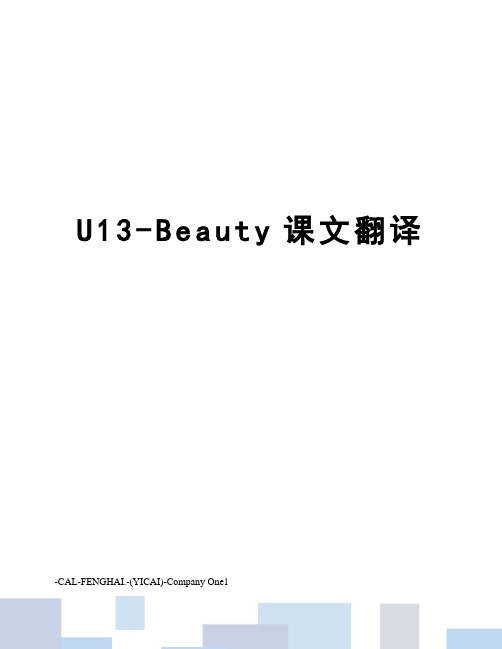
U13-B e a u t y课文翻译-CAL-FENGHAI.-(YICAI)-Company One1U13 BeautyFor the Greeks, beauty was a virtue: a kind of excellence. Persons then were assumed to be what we now have to call---lamely, enviously--- whole person. If it did occur to the Greeks to distinguish between a person’s “insi de” and “outside”, they still expected that inner beauty would be matched by beauty of the other kind. The well-born young Athenians who gathered around Socrates found it quite paradoxical that their hero was so intelligent, so brave, so honorable, so seductive ---- and so ugly. One of Socrates’ main pedagogical acts was to be ugly ---- and teach those innocent, no doubt splendid-looking disciples of his how full of paradoxes life really was.美之于古希腊人是一种德性一种美德。
今天看来他们就是我们如今所谓的“全面的人”虽然这个称呼有点不理直气壮,并且带有嫉妒之意。
倘若让古希腊人区分一个人的“内在”和“外在”他们仍期望内在美是需要与其他种类之美相匹配的。
Beauty(爱默生)译文
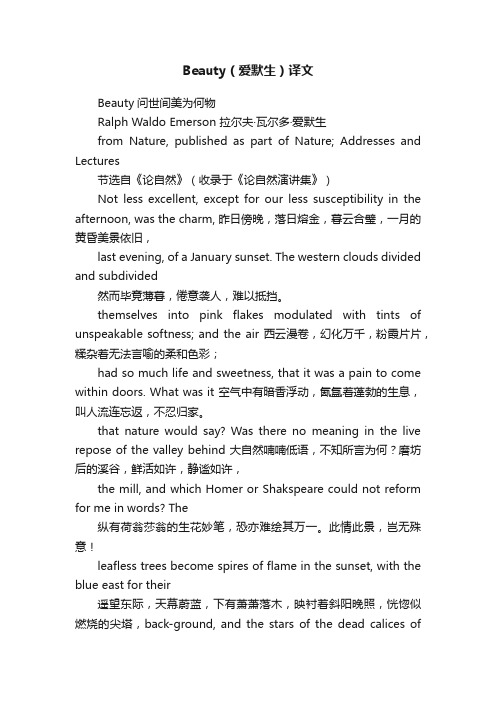
Beauty(爱默生)译文Beauty问世间美为何物Ralph Waldo Emerson 拉尔夫·瓦尔多·爱默生from Nature, published as part of Nature; Addresses and Lectures节选自《论自然》(收录于《论自然演讲集》)Not less excellent, except for our less susceptibility in the afternoon, was the charm, 昨日傍晚,落日熔金,暮云合璧,一月的黄昏美景依旧,last evening, of a January sunset. The western clouds divided and subdivided然而毕竟薄暮,倦意袭人,难以抵挡。
themselves into pink flakes modulated with tints of unspeakable softness; and the air 西云漫卷,幻化万千,粉霞片片,糅杂着无法言喻的柔和色彩;had so much life and sweetness, that it was a pain to come within doors. What was it 空气中有暗香浮动,氤氲着蓬勃的生息,叫人流连忘返,不忍归家。
that nature would say? Was there no meaning in the live repose of the valley behind 大自然喃喃低语,不知所言为何?磨坊后的溪谷,鲜活如许,静谧如许,the mill, and which Homer or Shakspeare could not reform for me in words? The纵有荷翁莎翁的生花妙笔,恐亦难绘其万一。
此情此景,岂无殊意!leafless trees become spires of flame in the sunset, with the blue east for their遥望东际,天幕蔚蓝,下有萧萧落木,映衬着斜阳晚照,恍惚似燃烧的尖塔,back-ground, and the stars of the dead calices offlowers, and every withered stem and 花瓣凋零,点点如繁星坠落,枝茎摧折,残株凝霜,stubble rimed with frost, contribute something to the mute music.这一切,共谱出无声的乐章。
大学英语口语教程 Beauty
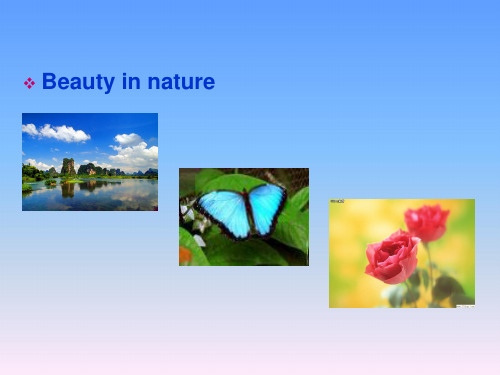
Discussion
❖ Work in pairs discussing the following questions, and then share your answers with the whole class.
❖ What’s the true beauty? ❖ What do you find beautiful? ❖ What is evidence of beauty to you? ❖ What do you consider as beauty in a
Key structures
❖ I guess what I'm asking is not only…but also…
❖ As we all know,… or it is wellknown that…
❖ But it seems to sb ❖ I’d like/ love/ hate/ prefer to… ❖ This is the most…
A: Come on. Here are a few lines about Hong Kong. Every minute, a ship enters or leaves Victoria Harbor of Hong Kong. B: A plane takes off or lands at Kai Tak International Airport of Hong Kong every three minutes. A: Oh, here are more. In terms of passenger flow, Kai Tak Airport is one of the three busiest in the world. B: Hong Kong International Airport was also identified by U.S.A’99 Architecture Exposition as one of the top 10 buildings of the 20th century all over the world.
- 1、下载文档前请自行甄别文档内容的完整性,平台不提供额外的编辑、内容补充、找答案等附加服务。
- 2、"仅部分预览"的文档,不可在线预览部分如存在完整性等问题,可反馈申请退款(可完整预览的文档不适用该条件!)。
- 3、如文档侵犯您的权益,请联系客服反馈,我们会尽快为您处理(人工客服工作时间:9:00-18:30)。
U13 BeautyFor the Greeks, beauty was a virtue: a kind of excellence. Persons then were assumed to be what we now have to call---lamely, enviously--- whole person. If it did occur to the Greeks to distinguish between a person’s “inside” and “outside”, the y still expected that inner beauty would be matched by beauty of the other kind. The well-born young Athenians who gathered around Socrates found it quite paradoxical that their hero was so intelligent, so brave, so honorable, so seductive ---- and so ugly. One of Socrates’main pedagogical acts was to be ugly ---- and teach those innocent, no doubt splendid-looking disciples of his how full of paradoxes life really was.美之于古希腊人是一种德性一种美德。
今天看来他们就是我们如今所谓的“全面的人”虽然这个称呼有点不理直气壮,并且带有嫉妒之意。
倘若让古希腊人区分一个人的“内在”和“外在”他们仍期望内在美是需要与其他种类之美相匹配的。
那些聚集在苏格拉底身边的雅典青年人发现自己的偶像是如此得聪慧、勇敢、正直、充满诱惑力而同时又那么得丑这是多么自相矛盾啊。
而苏格拉底主要的教学手段之一即为“丑”告诉这些天真却拥有毋庸置疑般美貌的门生真正的人生是充满悖论的。
They may have resisted Socrates’ lesson. We do not. Several thousand years later, we are more wary of the enchantments of beauty. We not only split off ---- with the greatest facility ---- the “inside” (character, intellect) from the “outside” (looks); but we are actually surprised when someone who is beautiful is also intelligent, talented, good.他们或许能够抗拒苏格拉底的学说。
而我们做不到。
几千年以后.美的魅惑使我们更加疲惫。
我们不仅仅用最容易的方式将“内在”(性格,心智)和“外在”(外貌)割离开来.同时我们也对那些既有美貌亦有智慧天赋之人,感到诧异。
It was principally the influence of Christianity that deprived beauty of the central place it had in classical ideals of human excellence. By limiting excellence (virtus in Latin) to moral virtue only, Christianity set beauty adrift ---- as an alienated, arbitrary, superficial enchantment. And beauty has continued to lose prestige. For close to two centuries it has become a convention to attribute beauty to only one of the two sexes: the sex which, however Fair, is always Second. Associating beauty with women has put beauty even further on the defensive, morally.美在古典时期是理想的人类美德,而将其从这中心位置赶走的首要原因来自基督教的影响。
通过美德(拉丁语为virtus)的概念限定到仅仅指伦理道德的范畴,基督教放逐了“美”——它成为一种异化的,武断的,肤浅的诱惑。
同时美不断丢失了它原本的名声。
到二世纪末的时候,美成为一种既定概念,仅用于修饰两性之的一个性别:这个性别虽然是悦目的,但却处于第二位。
将美与女性联系起来,使得美的概念在道德层面上更加脆弱。
A beautiful woman, we say in English. But a handsome man. “Handsome” is the masculine equivalent of ---- and refusal of ---- a compliment which has accumulated certain demeaning overtones, by being reserved for women only. That one can call a man“beautiful”in French and in Italian suggests that Catholic countries ---unlike those countries shaped by the Protestant version of Christianity---still retain some vestiges of the pagan admiration for beauty. But the difference, if one exists,is of degree only. In every modern country that is Christian or post-Christian, women are the beautiful sex ---- to the detriment of the notion of beauty as well as of women.在英语里,我们说一位女子是美丽的。
但是我们却说一位男子是英俊的。
“英俊”是其阳性的等同词,同时拒绝一种带有某些贬义暗示的赞扬,而这种赞扬是仅用于女性的。
在法语和意大利语里,人们可以称男子是“美丽的”,这暗示着这些天主教国家依旧保留了前基督教时期欣赏“美”的痕迹,而这些痕迹在新教国家中已经荡然无存。
但即使存在,差别也只是程度不同而已。
在任何一个基督教或者后基督教国家里,女性就是那个美丽的性别——既损害了美这个概念,也损害了女性这个概念。
To be called beautiful is thought to name something essential to women’s character and concerns. (In contrast to men ---- whose essence is to be strong, or effective, or competent.) It does not take someone in the throes of advanced feminist awareness to perceive that the way women are taught to be involved with beauty encourages narcissism, reinforces dependence and immaturity. Everybody (women and men) knows that. For it is “everybody”, a whole society, that has identified being feminine with caring about how one looks. (In contrast to being masculine ---- which is identified with caring about what one is and does and only secondarily, if at all, about how one looks.) Given these stereotypes, it is no wonder that beauty enjoys, at best, a rather mixed reputation.被称为“美”意味着要列举出一些对女性来说必要的特征和她们所关心的事物。
(和男性不同,他们的核心是强壮、有效率,或者有能力。
)那些拥有超前女性意识的人将很容易就能感受到,让女性和“美”联系起来,会助长她们孤芳自赏的态度也会让她们更加有依赖性且不成熟。
所有人(女性和男性)都认识到这点。
因为“所有人”,整个社会,都很明确,作为女性就应该关心长相。
(作为男性则不同:他们身份的确认是关注于某人是谁,做什么的,而长相即使并非一无是处,至少也是其次的。
)有了这些老套的看法,我们就不难明白,即使从最好的方面来看,为什么“美”也有着褒贬不一的名声。
It is not, of course, the desire to be beautiful that is wrong but the obligation to be ---- or to try. What is accepted by most women as a flattering idealization of their sex is a way of making women feel inferior to what they actually are ---- or normally grow to be. For the ideal of beauty is administered as a form of self-oppression. Women are taught to see their bodies in parts, and to evaluate each part separately. Breasts, feet, hips, waistline, neck, eyes, nose, complexion, hair, and so on ---- each in turn is submitted to an anxious, fretful, often despairing scrutiny. Even if some pass muster, some will always be found wanting. Nothing less than perfection will do.当然,对美的崇拜并没有什么错,错就错在认为美是一种义务,并且试图想要变美。
